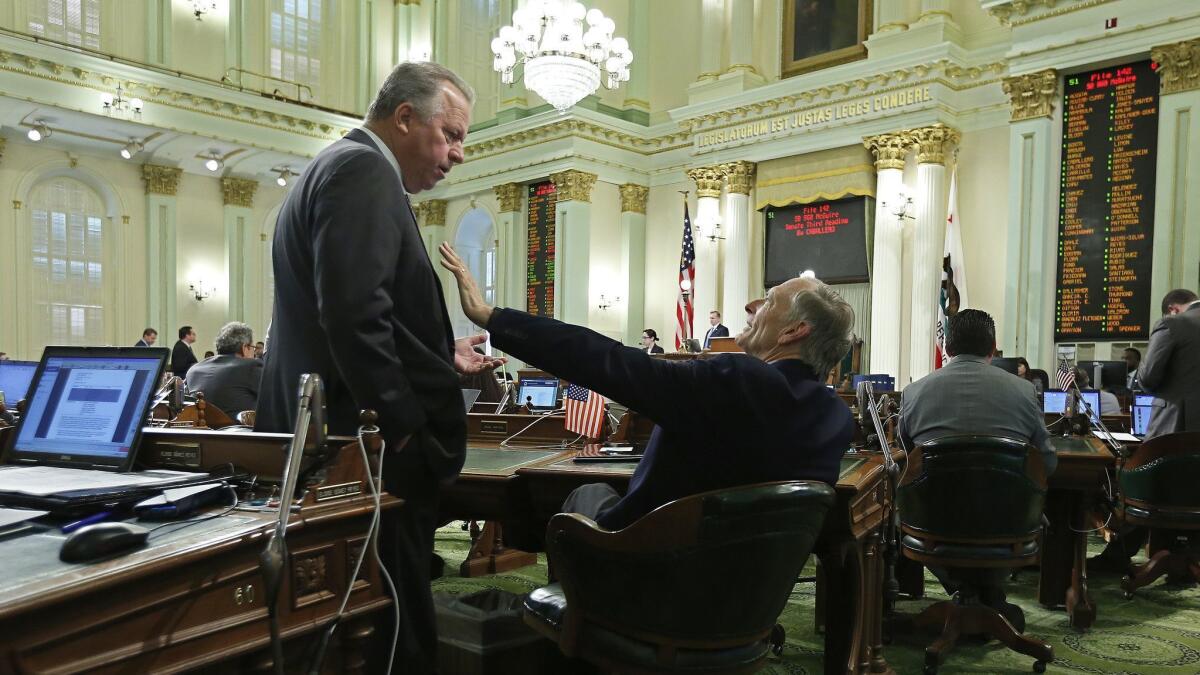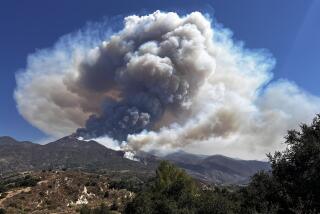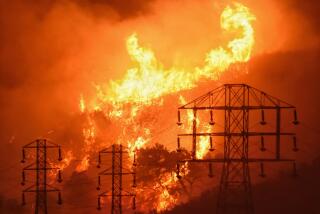Capitol Journal: After feeling the burn from constituents, California lawmakers decide to change how the state addresses wildfires

In the end, the California Legislature concluded that some companies — namely utilities — are just too big to fail.
You wouldn’t ordinarily think that about a leftist, heavily Democratic legislature not known for being business friendly.
But the lawmakers agonized and decided that private utilities should be allowed to raise customers’ electricity rates to help cover 2017 wildfire liabilities if that’s deemed necessary to forestall bankruptcy. They’d need to sell the rate hike to the California Public Utilities Commission.
“We’ve done everything we can to protect ratepayers,” Senate leader Toni Atkins (D-San Diego) said in a statement. But without the rate hike option, she continued, the utilities “face the dire prospect of bankruptcy. If we allowed that to happen, ratepayers would suffer deeper as rates spike [and energy] reliability is lost.”
Consumer advocates called the legislation a bailout.
The utilities — especially Pacific Gas & Electric Co. — didn’t like the legislation either. They had sought a more generous formula for determining financial liability when wildfires are sparked by their equipment, such as fallen power lines. PG&E says it faces up to $2.5 billion in liabilities from last year’s devastating wine country fires.
The bill did contain a more utility-friendly liability formula for catastrophic wildfires starting in 2019. Utilities could also seek rate hikes to help cover liability costs for those fires.
The sweeping legislation included a lot of other things too — mainly aimed at increasing the state’s fire prevention efforts by removing combustible fuel from woodlands. Legislators allotted $200 million annually for that purpose from the state’s greenhouse gas reduction fund.
With devastating blazes raging for weeks throughout California, legislators were under pressure from constituents to pass significant prevention and firefighting bills.
It was personal for many legislators who were threatened by flames the last two years, or feared the future “new normal.”
“We’re going into fire season when I go home,” Assemblywoman Marie Waldron (R-Escondido) told colleagues during the house debate, referring to the traditional peak fire months of September and October. “And I dread what that’s going to be when the Santa Ana winds blow.”
The fire legislation passed both houses late Friday night, just before lawmakers adjourned their two-year session.
It was a fairly productive session measured by the passage of important bills. There also were scores of frivolous bills sent to the governor. More on that another time.
From the get-go, the Legislature concluded that President Trump’s policies needed to be resisted at all costs — especially on illegal immigration. That was reflected in a sanctuary state bill the Legislature passed last year.
“If Trump hadn’t won the presidency, there’d be no need for this measure,” said then-Senate leader Kevin de León (D-Los Angeles), author of that bill. “There has to be a firewall to protect our state.”
De León’s bill was significantly toned down under a veto threat from Gov. Jerry Brown. It prohibited California law enforcement from joining federal agents in immigration raids. The idea was that local cops are paid to enforce local laws, not federal immigration statutes.
But if an immigrant in the country illegally is convicted of one of roughly 800 crimes, he can be reported to the feds before his release from jail.
Coverage of California politics »
Politically, Democrats would have been better off if they’d allowed jailers to tip off federal agents whenever any undocumented lawbreaker was released, regardless of his crime. The sanctuary bill, which mirrored the policies of several California cities, merely enhanced our national image as a radical left coast state.
The Legislature continued fighting Trump’s policies right up until the session’s end. It sent Brown a bill restoring net neutrality rules that federal regulators have scrapped.
Under the bill, broadband and wireless companies would be prohibited from favoring some websites over others by charging for faster speeds. Providers also would be barred from blocking access to content. The internet industry, of course, lobbied heavily against the measure, written by Sen. Scott Wiener (D-San Francisco).
The Legislature also consistently bucked Trump’s coal-oriented energy policies. He considers human-caused climate change a hoax.
State lawmakers passed an ambitious De León bill requiring California to obtain 100% of its energy from clean sources by 2045. The only other state with such a bold goal is Hawaii.
Brown, one of America’s loudest crusaders against climate change, was unusually silent on De León’s bill. But the governor’s expected to sign it as an overture to a big climate summit he’s holding next week in San Francisco.
Another monumental bill the Legislature passed and Brown signed last week will end California’s money bail system. No longer will defendants be locked up awaiting trial simply because they’re too poor. Judges will decide who’s a flight risk or a public danger and should be jailed — and who should be freed.
The bill’s author, Sen. Bob Hertzberg (D-Van Nuys), called the current system “perverse.”
The most gutsy — and contentious — thing the Democrat-controlled Legislature did during the two years was pass an unpopular increase in gas taxes and vehicle fees. The idea was to raise $5.2 billion annually, mostly for road repairs with some for transit.
Republicans are attempting to capitalize on the tax hike. They’re sponsoring a November ballot measure that would repeal the tax — and, they hope, light a fire under GOP voters. They just might do it.
Follow @LATimesSkelton on Twitter
More to Read
Get the L.A. Times Politics newsletter
Deeply reported insights into legislation, politics and policy from Sacramento, Washington and beyond. In your inbox three times per week.
You may occasionally receive promotional content from the Los Angeles Times.











